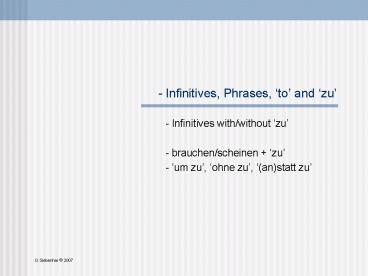Infinitives, Phrases, to and zu - PowerPoint PPT Presentation
1 / 12
Title:
Infinitives, Phrases, to and zu
Description:
- Infinitives, Phrases, to' and zu' - Infinitives with/without zu' ... nichts sagen: Jens kaufte seine Flugkarte nach Nepal. Ohne etwas zu sagen, kaufte Jens ... – PowerPoint PPT presentation
Number of Views:136
Avg rating:3.0/5.0
Title: Infinitives, Phrases, to and zu
1
- Infinitives, Phrases, to and zu
- - Infinitives with/without zu
- - brauchen/scheinen zu
- - um zu, ohne zu, (an)statt zu
D.Siebenhar ? 2007
2
Infinitives / Role of helping verbs
- Whats the big deal? ---gt helping verbs
- Helping verbs accomplish 3 things
- change mood
- change time
- extended use/hybrids
3
Infinitives / Role of helping verbs (mood)
- Mood-altering verbs modal verbs
- Use Lolle works for Sven. (no helping
verb) Lolle can work for Sven. (with helping
verb) - can changes the mood of the sentence when it
is forced into the usual second position
reserved for conjugated verb forms. work moves
toward the end of the sentence.
Modal verbs 1. have special status as
mood-changing 2. occupy second position
(English and German) 3. never conjugated
(English only) 4. never used alone (without some
context) 5. paired with a main verb in
infinitive form. 6. usually only used in present
tense
4
Infinitives / Role of helping verbs (mood)
- Special status modal verbs
- Lolle works for Sven. (no helping verb)
- Lolle can work for Sven. (with helping verb)
- You would never say
- Lolle can for Sven. (no main verb)
- Lolle cans for Sven. (no conjugation)
- Lolle can to work for Sven. (no to)
- Lolle cans to work for Sven. (thats
ridiculous!)
5
Infinitives / Role of helping verbs (time)
- I. Time-changing helping verbs haben - sein
(German) - Characteristics
- 1. conjugated (habe, hast bin, bist)
- 2. past participle (ge-Form)
- Lolle hat/hatte bei Svens Firma nicht
gearbeitet. - Lolle ist/war nach Berlin umgezogen.
- 3. basic forms dont need infinitives
- II. Time-changing helping verb werden (German)
- 1. conjugated (werde, wirst..)
- 2. used with infinitives (future)
- Lolle wird bei Svens Firma arbeiten.
6
Infinitives / extended use helping verbs
- Extended use helping verbs
- 1. regular verbs forced to be helping verbs
- 2. not approved mood or time helping verbs
- 3. must use to or zu (English and German)
Use try in Lolle finds a new life in Berlin.
Lolle ____ find a new life in Berlin.
tries
tries to
Lolle ______ find a new life in Berlin.
to marks the main verb(infinitive), not the
helping verb
7
Infinitives / extended use helping verbs)
- Extended use verbs (hybrids)
- haben direct object - sein
adjective - main verbs, helping verbs (time), hybrids
(extended use)
Use is adjective in It is hard for
Lolle to find a new life in Berlin.
Use have direct object in
Lolle has difficulties to have the rings engraved.
to infinitive has function of answering the
question what? and the what is an action/verb,
not a noun/pronoun
8
Infinitives / extended use helping verbs)
- German and English mirror one another
It is hard for Lolle to find a new life in Berlin.
Es ist schwer für Lolle, ein neues Leben in
Berlin zu finden.
Lolle had difficulties to have the rings engraved.
Lolle hatte Probleme, die Ringe gravieren zu
lassen.
Formula for the infinitive phrase 1. separated
by a comma 2. zu infinitive at the end of
the phrase
9
Special uses um..zu, ohne..zu, (an)statt..zu
in order to, without -ing, instead of -ing
- in order to
- Um eine Rolle zu finden, musste Rosalie zum
Casting gehen. - Rosalie musste zu Casting gehen, um eine Rolle
zu finden.
In order to find a role, Rosalie had to go to a
casting session.
ohne zu Ohne daran zu denken, sprang Sven in
das Wasser. Sven sprang ins Wasser, ohne daran
zu denken Without thinking, Sven sprang into the
water.
(an)statt zu Anstatt Karen zu heiraten,
gründete Lolles Vater eine Familie. Lolles Vater
gründete eine Familie, anstatt Karen zu heiraten.
Instead of marrying Karen, Lolles father started
a family.
10
- Übungen mit Infinitiven
Use the suggested helping verb in the sentence to
the right.
- wollen Lolle wohnt in Berlin
- Lolle will in Berlin wohnen.
(modal NO zu)
versuchen Sven gründete eine Softwarefirma.
Sven versuchte, eine Softwarefirma zu gründen.
planen Lolle wohnt in Berlin. Lolle plant, in
Berlin zu wohnen.
zugeben Sandra B. hat Orangenhaut. Sandra B.
gibt zu, Orangenhaut zu haben.
scheinen Hart hatte zu viel getrunken.
Hart scheint, zu viel getrunken zu haben.
11
- Übungen mit Infinitiven
Use the suggested helping verb in the sentence to
the right.
- Zeit haben Karen und Jens fliegen nach Nepal.
- Karen und Jens haben die Zeit, nach Nepal
zu fliegen.
arbeiten Lolle arbeitete nicht bei Sven. Sie
arbeitete im Imbiss. Statt bei Sven zu
arbeiten, arbeitete Lolle im Imbiss.
arbeiten Lolle wohnt in Berlin. Lolle
plant, in Berlin zu wohnen.
Karen heiraten Jens kaufte zwei Ringe. Jens
kaufte zwei Ringe, um Karen zu heiraten.
nichts sagen Jens kaufte seine Flugkarte nach
Nepal. Ohne etwas zu sagen,
kaufte Jens eine Flugkarte nach Nepal.
12
Ende des Podcasts - Infinitives/Phrases
Links für online Übungen finden Sie bei den
Online-Diensten des Sprachlabors, Irvin Hall
60 http//montgomery.cas.muohio.edu/ilrc-online/
German/Deutsch20Na20Klar204th20Edition/Web/































